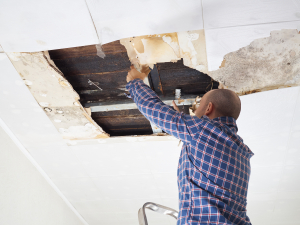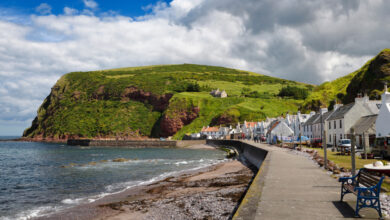How to prevent water leaks in your holiday home

Last Updated on September 22, 2025 by admin
The risk of water leaks in homes across the UK is increasing. In 2024, nearly 1 in 3 home insurance claims made were for escape of water.1 This topped the list of claims at 28.63%, beating claims for accidental loss/damage at home, and storm damage.2
In this article, we look at how to prevent water leaks in holiday homes, and how your Holiday Let Insurance can help mop up the mess.
What does ‘escape of water’ mean?
In insurance, “escape of water” refers to accidental water damage caused when water leaks, burst, or overflows from pipes, tanks, appliances, or fixed installations. Common examples include burst pipes during freezing weather, a leaking washing machine, or an overflowing water tank.
It does not usually cover flooding from external sources (like rivers or heavy rain) — that falls under flood cover. Escape of water focuses on internal, accidental leaks within the property.
To discuss Home Insurance for your holiday home, cottage complex, or second home, contact us today.
Call: 01237 429 444
Request a Quote: boshers.co.uk/get-your-quote/
How to avoid escape of water
Educating yourself on burst pipe prevention in your holiday let is key to mitigating the risk of escape of water.
- If the property is going to be empty for an extended period, consider isolating and draining the water supply or ensure heating to the property is maintained to at least 10 degrees.
- Locate high value items clear of any overhead water tanks or pipework.
- Install leak and/or flow detection devices in high-risk areas. These devices will detect a water leak in the earlier stages, raise an alert and can isolate the water supply, minimising the damage caused.

Leak detection for holiday cottages
Install a water leak detection device. The best leak detectors for holiday homes include the following types:
- A simple self-install unit which monitors water flow and alerts you if there is a potential issue. It works by detecting changes to the flow of your water supply and sending you a notification via an alarm or smartphone notification. This will help identify whether there could be an issue and gives you the option of turning off your water supply and conducting further investigations.
- A more sophisticated device which is installed by a plumber and will automatically stop the water supply in your home if a problem is detected.
Stopcock location advice
Familiarising yourself with how find a stopcock in a holiday let you own is the first step in mitigating the risk of a water leak when your property is unoccupied, or in case of an emergency such as escape of water.
- Look under the kitchen sink – where stopcocks are often located
- If it’s not under the sink, check the utility cupboard or where the boiler is installed
- It may also be in the basement, garage, near the water meter, behind access panels in the bathroom or in hallway cupboards
Advice on winterising pipes in unoccupied holiday cottages
There are several steps you can take to insulate (also known as lag) your property’s pipes during winter:
- Drain down all water systems to prevent freezing
- Turn off the stopcock and open all taps to release pressure
- Lag exposed pipes, especially in lofts, garages, and external walls
- Insulate water tanks with suitable covers
- Keep low-level heating on a timer to maintain above-freezing temperatures
- Leave clear instructions for guests on emergency shut-off
- Arrange regular winter inspections for peace of mind
Please note it may be a condition of your insurance policy to isolate building services during extended periods of unoccupancy. If you are unsure check with your insurer.

Trace & access cover explained
Trace and access cover is an add-on to holiday let insurance policies that helps with the cost of locating and exposing the source of a water leak. Standard policies usually pay for the damage caused by water but not for the investigation work itself. Trace and access cover can include costs for professional leak detection, removing flooring, lifting carpets, or opening up walls to find the problem. Once located, it also covers the reasonable cost of putting those areas back in good order afterwards. Without this cover, you could face significant bills for investigation and repair beyond the leak damage.
FAQs
Should I turn off water between lets?
Yes, it’s best to turn the water off between holiday lets. Shutting off the stopcock reduces the risk of leaks, bursts, or flooding while the property is empty. It also helps protect against costly damage, especially in colder months when pipes are more vulnerable to freezing.
What is the insurance excess for escape of water claims?
The insurance excess for escape of water claims is the amount you must personally pay towards the repair or replacement costs before your insurer covers the rest. Excess levels vary by policy and insurer, so always check your documents for the exact figure.
To discuss Home Insurance for your holiday home, cottage complex, or second home, contact us today.
Call: 01237 429 444
Request a Quote: boshers.co.uk/get-your-quote/
1-2. https://press.gocompare.com/news/water-woes-new-data-reveals-escape-of-water-tops-home-insurance-claims#:~:text=Percentage%20of%20overall*,any%20potential%20issues%20in%20advance.
This guidance is provided for information purposes and is general and educational in nature. It should not be used as a substitute for taking professional advice on specific issues and should not be taken as providing legal advice on any of the topics addressed.
Boshers® Ltd are authorised and regulated by the Financial Conduct Authority under register number 224623. Registered in England No. 02946794. Registered office: Affinity House, Bindon Road, Taunton, Somerset, TA2 6AA. Calls may be recorded for use in quality management, training and customer support.



